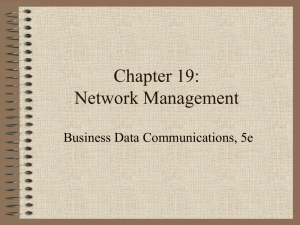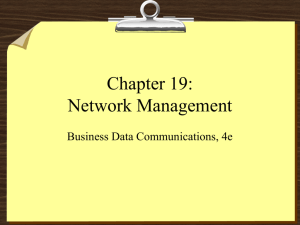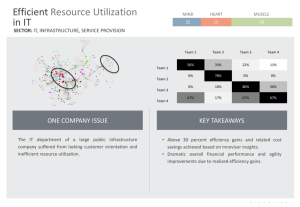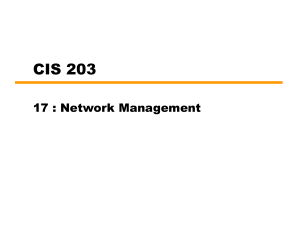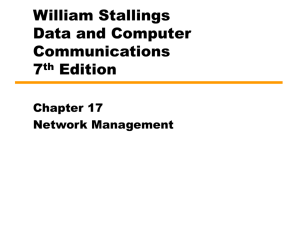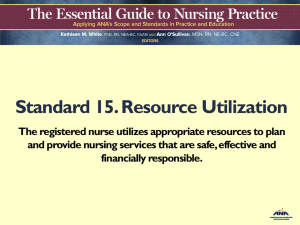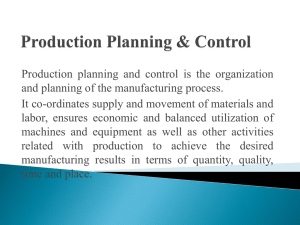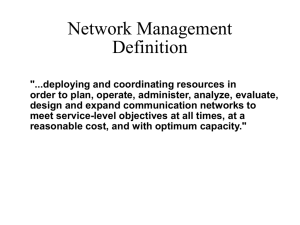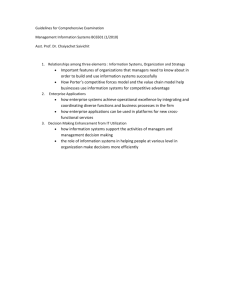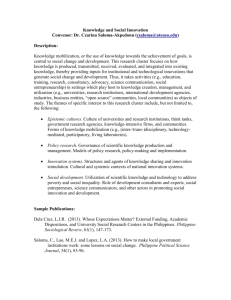Network Management Functions
advertisement
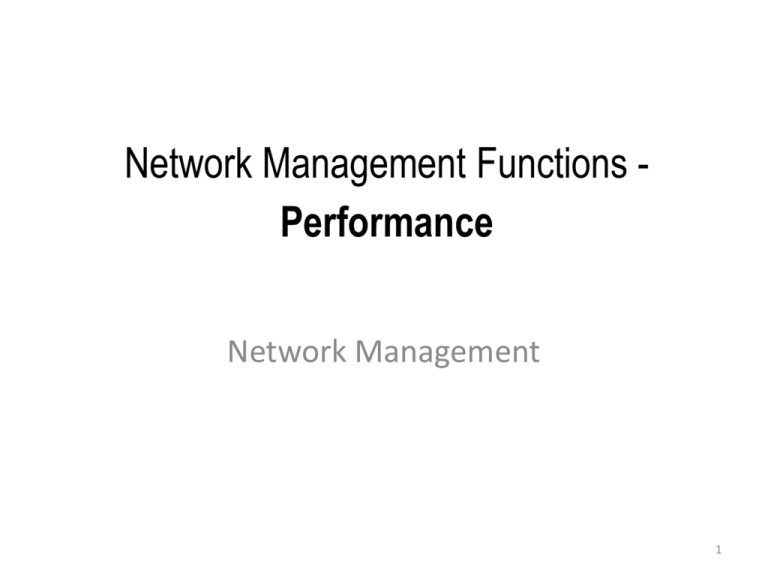
Network Management Functions Performance Network Management 1 Lectures Schedule Week Week 1 Week 2 Week 3 Week 4 Week 5 Week 6 Week 7 Topic Computer Networks - Network Management Architectures & Applications Network Management Standards Architectures & Applications Simple Network Management Protocol - SNMP v1, ASN, MIB, BER Network Management Functions - Fault Simple Network Management Protocol - SNMP v2 - Configuration Network Management Functions - Accounting Midterm Week 8 Week 9 Simple Network Management Protocol - SNMP v3 - Performance Week 10 Week 11 Week 12 Remote Network Monitoring RMON 1, SLA Week 13 Week 14 NM Project Presentations NM Project Presentations Week 15 NM Project Presentations Network Management Functions – Security Remote Network Monitoring RMON 2 Management Tools, Systems and Applications 2 OSI NM Architecture and Model Manager Network Management Organization Model Agent Object Structure of Management Information (SMI) Information Model Management Information Base (MIB) Communication Model Protocol Data Unit (PDU) Configuration Management (CM) Fault Management (FM) Functional Model Performance Management (PM) Security Management (SM)a Accounting Management (AM) 3 Network Management Functions Corporate Network Management Administration Mgmt Capacity Mgmt Performance Mgmt Configuration Mgmt Accounting Mgmt Provisioning Mgmt Traffic monitoring Throughput Utilisation Fault Mgmt Security Mgmt 4 SNMP Milestone SGMP SNMP draft SNMP SNMPv2 Security SMP (parties) full standard SNMPv2 (community) SNMPv3 implementation experience proposed draft standard standard draft standard proposed standard 5 Standard • SMI (Structure of Management Information) Define how management information may look like – SMIv1: RFC 1155 – SMIv2: RFC2578 (currently used) • MIBs (Management Information Bases) Tell what management information exists – MIB-I: RFC1156 – MIB-II: RFC1213 • SNMP (Simple Network Management Protocol) Define how information is exchanged – SNMPv1: RFC1157 – SNMPv2: RFC1901, 1905, 1906 – SNMPv3: RFC2571-2575 6 Structure 7 Performance Management • Issues of concern to the network manager include: – – – – – What is the level of capacity utilization? Is there excessive traffic? Has throughput been reduced to unacceptable levels? Are there bottlenecks? Is response time increasing? • Network managers need performance statistics to help them plan, manage, and maintain large networks 8 Performance Monitoring • After availability, the second most important characteristic of a network is performance • Performance data must be available in sufficient detail to be able to assess the bottleneck that is causing the problem and to plan appropriate remedial action 9 Performance Management: Definition The Utilization of • Network Resources with The Ability to meet • User Service Level Objectives 10 Performance Management: Activities • Information Gathering – Current System (Traffic / Resources) – System History (Logs) • Performance Evaluation (Analysis) For Different States / Conditions • Understanding / Reporting 11 Network: Performance Traffic Process Arrival (Rate) Service (Time) Load Busy Period Measures Errors Channel Quality Monitor Load / Capacity Delay Measures Utilization Throughput 12 Traffic Load Limits It's Not The Volume, It's The Time It Takes To Double... • “It’s not the heat, it’s the humidity…” • Example: Daily Usenet News volume (e.g., ~200GB/day now, doubling every 6 mos.) 13 Performance Management Sub-Categories and Related Activities Collecting Baseline Utilization Data · · · · · · Collecting a History of Utilization Data · Measuring utilization and response times at different times of the day · Measuring utilization and response times on different days over an extended period Capacity Planning · Manually graphing or using a network management tool to graph utilization as a function of time to detect trends · Preparing trend reports to document projected need for and the cost of network expansion. Measuring link utilization using a probe Counting packets received/transmitted by a specific device Measuring device processor usage Monitoring device queue lengths Monitoring device memory utilization Measuring total response times Performance Management Sub-Categories and Related Activities (cont.) Setting Notification Thresholds · Having a network management tool poll devices for values of critical parameters and graphing these values as a function of time · Setting polling intervals · Setting alarms/alerts on those parameters when the threshold is reached or a percentage of it is reached · Initiating an action when the threshold is reached such a sending a message to the network manager. Building Databases · Having the network management tool create a database of records containing device name, parameter, threshold and time for off-line analysis. · Using the database to extract time dependence of utilization · Using the time dependence of parameters to decide when network upgrades will be necessary to maintain performance Running Network Simulations · Using a simulation tool to develop a model of the network · Using the model’s parameters and utilization data to optimize network performance Latency · Query/Response time interval Chapter 12 MRTG • Multi Router Traffic Grouper (Oeticker and Rand) • www.ee.ethz.ch/stats/mrtg/ • Generates graphic presentation of traffic on Web • Daily view • Weekly view • Monthly view • Yearly view Example of Performance Management Obtaining Baseline Measurements • Baseline: report of network’s current state of operation – Baseline measurements allow comparison of future performance increases or decreases caused by network changes with past network performance • The more data gathered while establishing the baseline, the more accurate predictions will be • Several software applications can perform baselining 18 Performance and Fault Management • Performance management: monitoring how well links and devices are keeping up with demands • Fault management: detection and signaling of device, link, or component faults • Organizations often use enterprise-wide network management software – At least one network management console collects data from multiple networked devices at regular intervals • Polling 19 Performance and Fault Management (continued) • Each managed device runs a network management agent – Collects information about device’s operation and provides it to network management application • Definition of managed devices and data collected in a Management Information Base (MIB) • Simple Network Management Protocol (SNMP): TCP/IP protocol used by agents to communicate 20 Performance and Fault Management (continued) 21 Performance and Fault Management (continued) • Network management application can present an administrator with several ways to view and analyze data • Network management applications are challenging to configure and fine-tune • Multi Router Traffic Grapher (MRTG): command-line utility that uses SNMP to poll devices, collects data in a log file, and generates HTML-based views of data 22 Performance and Fault Management (continued) 23 Network Statistics • • • • Baseline Trouble shooting Capacity planning for the future Reports Traffic Load: Source HostTopN Host 1 Host 2 Host 3 Host 4 Host 5 Host 6 Host 7 Host 8 Host 9 Host 10 0 100 200 Giga Octets 300 400 Traffic Load: Source/Destination Protocol Distribution Chapter 12 Traffic Load: Source Figure 12.16 Load Statistics: Monitoring of Sources Chapter 12 Traffic Load: Destination Chapter 12 Traffic Load: Conversation Chapter 12 Protocol Distribution Figure 12.19 Protocol Distribution (NetMetrix) Conclusions •SLA •Measure Performance •Meet requirements •Evaluations of the Behaviour & Cost-Effectiveness of Network Resources
